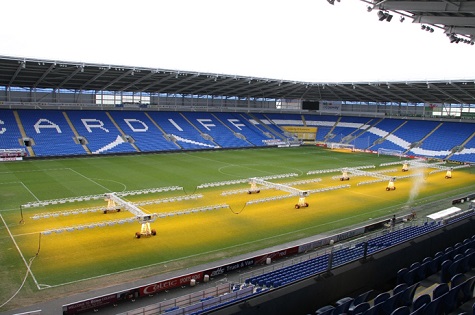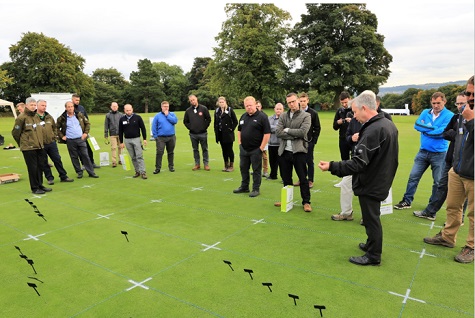

In the first of this series of articles, we sought to get a clearer definition of what sustainability is and what it means to an organisation, especially in the amenity horticulture sector. Sustainability comprises three pillars or components namely economic viability, environmental protection and social equity. The definition of these is important when any organisation seeks to become more sustainable, or indeed seeks to deliver more sustainable products and services to its customers. The remaining articles on this subject will now look more closely at various sub sectors of, and activities in amenity, and those providing services to them which hopefully will help all readers in their own search for sustainability. Previously we considered Sustainability In Practice, Sustainability At The Sharp End, Sustainability In Supply, Managing Weeds Sustainably, Innovation & Sustainability and Life Cycle Analysis and Sustainability.
This month we focus particularly on the area of skills and education in terms of achieving better sustainable practice.
Over previous articles, we have looked at examples of sustainable practice and how small changes can make a real difference. We have reviewed how organisations across the amenity sector are seeking to adopt more sustainable practice and looked at developments in research and innovation. There is much to learn, and education, skills training and continuing professional development (CPD) is set to play a crucial role going forward, both in terms of updating for existing staff and for new entrants.
We are in a very changing and challenging world. External pressures, both economic and in other ways, are requiring different approaches to be adopted. In pest, weed and disease management for example, the emphasis now is on integrated approaches with established practices needing to adapt to new methodologies, technologies and products, as well as the loss of certain plant protection products. Those already working in, and those seeking to enter the sector, will require this change to be reflected in education, updating and training opportunities and requirements.
Organisations such as Lantra are already very much on the case in terms of their existing training materials and qualifications. They have commissioned external specialists to review both existing qualifications and learning materials across the board, in preparation for re-writes as needed to better reflect sustainable practices and objectives. They have also engaged in discussions with providers, seeking to identify new qualifications that might be needed, relating to national sustainability goals and changes in practice already being adopted in the sector.

Reflecting changing ways of learning, they are looking at increasing the number of bite size courses on topics such as, for example, establishing and maintaining green rooves, and in assisting organisations in analysis of processes and supply chains (life cycle analysis) to improve sustainably in their practices. They see sustainability not as a separate subject, but integral to all they seek to deliver and assess within their qualifications offer and support to the sector.
Driving forward with education and training also needs to attract new people into the sector. In that regard, Lantra has recently launched a new online careers resource that aims to help tackle a shortage of skilled workers in landbased and environment industries. By providing detailed information about the wide variety of careers, Lantra seeks to attract new talent from a more diverse range of backgrounds, helping the industry to flourish and meet a rising demand for creators and stewards of the nation’s green spaces, The goal is to break down the barriers to attracting new entrants and providing the workforce with the right tools and training it needs to hone skills and develop careers. This will be achieved by engaging with businesses and local authorities to understand which common operational skills are most lacking, preventing overall service delivery.

In terms of education, City & Guilds are leading on the development of newly introduced T levels and these too seek to fully reflect sustainability considerations in both design and implementation. T Levels are 2-year courses which are taken after GCSEs and are broadly equivalent in size to 3 A Levels. These courses have been developed to meet the needs of industry and prepares students for entry into skilled employment, an apprenticeship or related technical study, through further or higher education. T Levels offer students’ practical and knowledge-based learning at a school or college, and on-the-job experience through an industry placement. Looking forward, such students will be seeking employment, and, along with the vital skills needed both practically and in knowledge gained, being able to ensure sustainable practices are always key to actions will be vital.
BASIS Registration is a well-established and respected organisation in our sector, it also seeks to ensure that, in delivering or assessing training, sustainable practice is a fundamental part of the process. They too have reviewed all their existing processes and their wider offer, to ensure that they reflect sustainable practice. They have developed innovative training materials using their digital learning platform, BASIS Classroom. Currently, as part of this offer, they have a course focussing on sustainable practice in agriculture and, under development, is a similar one for the amenity sector. The courses within Classroom include assessment and are fully recognised as continuing professional development programmes.
As a senior member of the BASIS team says ‘In considering the need for sustainable practice and meeting net zero targets as a nation, we must not forget the three pillars include economic. If we are to drive forward with sustainable practice it must be economically viable. Sustainability is not a subject on its own but part of what we do as best practice’
Recently the European Commission adopted a recommendation for learning for sustainable development. Within it was stated ‘ Education and training must respond to the challenges and realities of the 21st century, meet learners’ needs and help them to deal with changing challenges in society and the workplace. To equip learners with the competencies needed to shape a more sustainable economy and society, learning programmes need to be transformative and interdisciplinary.’
This may seem somewhat management speak but demonstrates that the sustainability agenda is not just in the UK but global, something to be picked up on in a future article in this series. Economies in many countries are under stress and organisations are struggling to adapt to new national agendas whilst remaining profitable and delivering customer expectations. Delivering education and training to reflect this change, and in new and exciting ways, will be vital.

Membership organisations such as the British Association of Landscape Industries (BALI), the Grounds Management Association (GMA) and the British and International Golf Greenkeepers Association (BIGGA) all put great emphasis on updating and providing such opportunities against a background of sustainable practice. At the last SALTEX event organised by GMA, sustainability was a key theme both in the demonstrations, on the stands and in the learning opportunities offered. A similar thing can be said for the last BTME event organised by BIGGA. The author of this article has also recently spoken at the Sports and Grounds Exhibition where sustainability and ways of developing sustainable practice were fully at the core of the event.

However recognising the complexity of the subject, again the emphasis must be on taking small steps. Wayne Grills, from BALI, says his organisation has established a task and finish group seeking to ensure clarity of message to their members built upon a practical and workable strategy. Like other organisations, in its own operations, it has sought to adopt more sustainable practice but it recognises the complexity of the topic and the need to have clear and concise messaging to members who then, in turn, can seek to adopt them in their own organisations. As he puts it in a landscaping context, not only do we need to plan and develop more sustainable spaces and structures, but these need proper ongoing maintenance as , if not, the expected outcomes for sustainability will not be met. Wayne also emphasises the importance of life cycle analysis in determining sustainable practice. Whatever is done must be practical or else we are in danger of greenwashing.
The availability of skilled labour is an ongoing challenge for the amenity sector. The need is twofold; firstly a need to attract and train new entrants with the right skills. Secondly there is a need to develop on-going training provision for those already in the sector. Again it must be emphasised that we do not need sustainable practice as a separate subject but to be considered in all current practices if it meets the criteria of the three pillars of sustainability. Developing training programmes and emphasising the importance of continuing education and professional development are crucial for ensuring a future workforce that can effectively address the evolving needs of the industry.
Learning is a lifelong process of growth and development. It can empower us to become empathic individuals, build our self-confidence, learn more about our strengths and address our weaknesses. It makes us better as people and in the work we undertake. Never as it been so important for all organisations to ensure their staff have the necessary skills and access to CPD in order to undertake their roles effectively and efficiently. They must invest in giving the time for existing workers to keep abreast of developments. This is certainly the case for sustainable practice.
A quote, I very much like, to end this current article comes from Sydney Harris and is ‘The purpose of education and ongoing professional development is to turn mirrors into windows’
The next article in this series will seek to provide a more global perspective of sustainability, how others are addressing the issue, and examine the implications for all who are involved in our vital and essential amenity sector